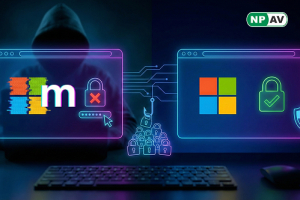Npav Lab
-
Read moreMicrosoft's September 2025 Patch Tuesday updates disrupt SMBv1 connectivity over NetBT in Windows 11/10 and Servers (2022/2025), exposing legacy risks like EternalBlue/WannaCry. Learn affected systems, security dangers, PowerShell fixes, and migration tips to SMBv2/3.
-
Read moreSince August 2024, BankBot.Remo variants use WebSocket chunked downloads on spoofed Google Play pages to deliver malware as fake payment/identity apps like IdentitasKependudukanDigital.apk; over 100 Alibaba/Gname domains evade filters—monitor WebSockets and block C2 for defense.
-
Read moreTA415 (APT41) uses Google Sheets, Calendar, and VS Code Remote Tunnels for stealthy C2 in spearphishing attacks targeting U.S. policy entities on trade/sanctions. From July-August 2025, WhirlCoil loader evades detection; evolve defenses with cloud anomaly monitoring.
-
Read moreCISA details threat actors exploiting CVE-2024-36401 in GeoServer for initial access to a U.S. federal network on July 11, 2024, using webshells, dirtycow escalation, and lateral movement—undetected until July 31. Key lessons: Immediate KEV patching, enhanced IR plans, and continuous EDR monitoring.
-
Read moreAverage breakout time drops to 18 minutes (June-August 2025, per ReliaQuest), fueled by automation and Oyster malware's abuse of rundll32.exe for DLL loading via scheduled tasks. Learn about Gamarue USB attacks, AI-driven malvertising, and defenses like behavioral monitoring.
-
Read moreThe npm package "fezbox" (alias janedu) disguises as a JS/TS utility library but hides credential-stealing code in a Cloudinary QR image. Discovered by Socket Threat Research, it uses reversed strings and obfuscation to evade detection—learn risks and defenses like CI/CD scanning and zero-trust dependencies.
-
Read moreMalicious fake online speedtest tools, uncovered September 21, 2025, use obfuscated JavaScript, Node.js, and Inno Setup to exfiltrate system data to C2 servers like cloud.appusagestats[.]com. Learn about XOR-encoded commands, execution risks, and key mitigations like EDR and app whitelisting.
-
Posted: September 23, 2025Views: 68Read moreRajya Sabha MP Sudha Murty faces cyber scam call impersonating Telecom Ministry, alleging obscene video misuse and Aadhaar linking threats. FIR under IT Act filed in Bengaluru; police trace fraudster amid rising "digital arrest" tactics targeting high-profile figures.
-
Read moreIranian threat group Nimbus Manticore (UNC1549) targets job seekers with phishing via fake recruitment sites mimicking Boeing and Airbus, delivering evasive malware like MiniJunk and MiniBrowse. Explore tactics, expansion to Western Europe, and essential mitigations for defense and telecom sectors.
-
Read moreAttackers abuse Oracle Database Scheduler's External Jobs via extjobo.exe to execute commands, tunnel RDP with Ngrok, escalate privileges, and deploy ransomware. Learn about the breach tactics, cleanup methods, and key mitigations to secure database environments.









